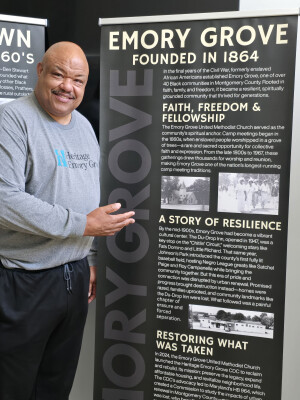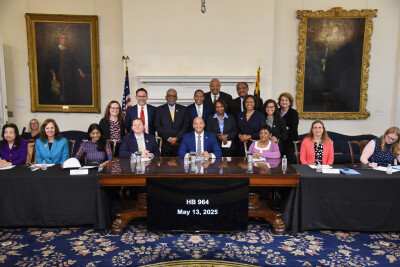Legislative advocacy becomes way for Emory Grove UMC to achieve ministry goals
 When Rev. Timothy Warner came to Emory Grove United Methodist Church thirteen years ago, advocacy wasn’t in the congregation’s skillset.
When Rev. Timothy Warner came to Emory Grove United Methodist Church thirteen years ago, advocacy wasn’t in the congregation’s skillset.
The church was on the verge of closing, and there was hurt in the congregation. As he met with leadership on a retreat, they pinpointed the hurt. The congregation was not mourning an individual person, but the neighborhood that gave birth to the congregation in the first place.
“We began to ask God together, ‘What is God going to do with us together at this moment?’” Warner said. “It’s not about dying. It’s about how do we stay alive, how do we grow? The vision that emerged out of that conversation was that God was calling us to rebuild the community in this physical space.”
But eventually, advocacy became a vital part of achieving their ministry goals.
Urban “renewal”
The Emory Grove community was started by freed slaves in 1864, and over the decades, it became a tight-knit community of over 500 people. It became known for hosting Methodist camp meetings, one of the largest Black-led camp meetings on the East Coast. Warner described a community of people who watched out for each other's children, never locked their doors, and made sure there was enough to go around.
But by the 1970s, “urban renewal” efforts had decimated the predominantly Black community. That includes purchasing homes from Black families for pennies on the dollar to put in public water lines, and then giving people Section 8 housing that could not be owned to create generational wealth.
In recent years, Warner and the leaders of Emory Grove have considered ways to demonstrate Christ’s love for the community. They settled on an affordable housing project that would honor the community’s history, while welcoming people into the community who might not be familiar with the area’s history. The average cost of a single-family home in Montgomery County is more than $1 million.
The planned development will be home to 550 units of housing, including 39 townhomes on the church’s property and 162 units on Housing Opportunity Commission land. Thirty percent of units will be affordable, double the mandated amount of 15 percent. Units will include both rentals and properties for sale.
“Housing is just out of reach for most people in this county,” Warner said. “It’s become a place where you can work, but it’s difficult for anyone, unless your income’s very high, to live in this place.”
The congregation began purchasing properties one at a time on their block. Now, they own the whole block.
Advocacy as ministry
Emory Grove’s ministry could not be secured by the sheer will of the congregation.
The congregation, in order to achieve its vision of affordable housing, had to learn new skills. That included advocating in the political arena.
Through their advocacy, the Emory Grove congregation successfully changed two zoning amendments: one that allows townhouses and apartments to be the same height and another that makes it easier for faith communities to develop multi-family housing on their properties.
“We’ve had to acquire some skills and do some new ministries,” Warner said. “This is really about as much community development as it is about church revitalization. Advocacy has become a very big deal at our church.”
“We are recognizing that the things we are hearing from God that we need to do can not be done without some change in policy,” he added.
 However, another major accomplishment took place in Annapolis at the state level. Partnering with their local state representative, the Maryland state legislature passed a bill that mandates the creation of a task force to study urban renewal practices at Emory Grove and the people displaced by such policies.
However, another major accomplishment took place in Annapolis at the state level. Partnering with their local state representative, the Maryland state legislature passed a bill that mandates the creation of a task force to study urban renewal practices at Emory Grove and the people displaced by such policies.
Members will include people from across the community, and culminate in public meetings on how to best repair the damage caused by urban renewal policies. Warner explains that a major part of the church’s ministry involves working toward justice for people with the least.
“We worship Jesus of Nazareth at Emory Grove, who has both feet on the ground and is preferential to poor persons to the point where he is among them,” Warner said. “Jesus’ social location is in places like Emory Grove. If we are to be disciples of that Christ, the justice that Christ demands looks like us being in the mix with poor people, fighting against poverty and marginalization of all types.”
